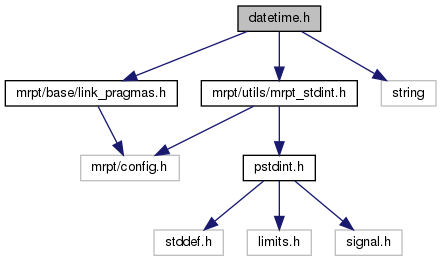|
| mrpt::system::TTimeStamp BASE_IMPEXP | mrpt::system::buildTimestampFromParts (const mrpt::system::TTimeParts &p) |
| | Builds a timestamp from the parts (Parts are in UTC) More...
|
| |
| mrpt::system::TTimeStamp BASE_IMPEXP | mrpt::system::buildTimestampFromPartsLocalTime (const mrpt::system::TTimeParts &p) |
| | Builds a timestamp from the parts (Parts are in local time) More...
|
| |
| void BASE_IMPEXP | mrpt::system::timestampToParts (TTimeStamp t, TTimeParts &p, bool localTime=false) |
| | Gets the individual parts of a date/time (days, hours, minutes, seconds) - UTC time or local time. More...
|
| |
| mrpt::system::TTimeStamp BASE_IMPEXP | mrpt::system::getCurrentTime () |
| | Returns the current (UTC) system time. More...
|
| |
| mrpt::system::TTimeStamp | mrpt::system::now () |
| | A shortcut for system::getCurrentTime. More...
|
| |
| mrpt::system::TTimeStamp BASE_IMPEXP | mrpt::system::getCurrentLocalTime () |
| | Returns the current (local) time. More...
|
| |
| mrpt::system::TTimeStamp BASE_IMPEXP | mrpt::system::time_tToTimestamp (const double t) |
| | Transform from standard "time_t" (actually a double number, it can contain fractions of seconds) to TTimeStamp. More...
|
| |
| mrpt::system::TTimeStamp BASE_IMPEXP | mrpt::system::time_tToTimestamp (const time_t &t) |
| | Transform from standard "time_t" to TTimeStamp. More...
|
| |
| double BASE_IMPEXP | mrpt::system::timestampTotime_t (const mrpt::system::TTimeStamp t) |
| | Transform from TTimeStamp to standard "time_t" (actually a double number, it can contain fractions of seconds). More...
|
| |
| double | mrpt::system::timestampToDouble (const mrpt::system::TTimeStamp t) |
| | Transform from TTimeStamp to standard "time_t" (actually a double number, it can contain fractions of seconds). More...
|
| |
| double BASE_IMPEXP | mrpt::system::timeDifference (const mrpt::system::TTimeStamp t_first, const mrpt::system::TTimeStamp t_later) |
| | Returns the time difference from t1 to t2 (positive if t2 is posterior to t1), in seconds. More...
|
| |
| double | mrpt::system::now_double () |
| | Returns the current time, as a double (fractional version of time_t) instead of a TTimeStamp. More...
|
| |
| mrpt::system::TTimeStamp BASE_IMPEXP | mrpt::system::timestampAdd (const mrpt::system::TTimeStamp tim, const double num_seconds) |
| | Shifts a timestamp the given amount of seconds (>0: forwards in time, <0: backwards) More...
|
| |
| mrpt::system::TTimeStamp BASE_IMPEXP | mrpt::system::secondsToTimestamp (const double nSeconds) |
| | Transform a time interval (in seconds) into TTimeStamp (e.g. More...
|
| |
| std::string BASE_IMPEXP | mrpt::system::formatTimeInterval (const double timeSeconds) |
| | Returns a formated string with the given time difference (passed as the number of seconds), as a string [H]H:MM:SS.MILISECS. More...
|
| |
| std::string BASE_IMPEXP | mrpt::system::dateTimeToString (const mrpt::system::TTimeStamp t) |
| | Convert a timestamp into this textual form (UTC time): YEAR/MONTH/DAY,HH:MM:SS.MMM. More...
|
| |
| std::string BASE_IMPEXP | mrpt::system::dateTimeLocalToString (const mrpt::system::TTimeStamp t) |
| | Convert a timestamp into this textual form (in local time): YEAR/MONTH/DAY,HH:MM:SS.MMM. More...
|
| |
| std::string BASE_IMPEXP | mrpt::system::dateToString (const mrpt::system::TTimeStamp t) |
| | Convert a timestamp into this textual form: YEAR/MONTH/DAY. More...
|
| |
| double BASE_IMPEXP | mrpt::system::extractDayTimeFromTimestamp (const mrpt::system::TTimeStamp t) |
| | Returns the number of seconds ellapsed from midnight in the given timestamp. More...
|
| |
| std::string BASE_IMPEXP | mrpt::system::timeToString (const mrpt::system::TTimeStamp t) |
| | Convert a timestamp into this textual form (UTC): HH:MM:SS.MMMMMM. More...
|
| |
| std::string BASE_IMPEXP | mrpt::system::timeLocalToString (const mrpt::system::TTimeStamp t, unsigned int secondFractionDigits=6) |
| | Convert a timestamp into this textual form (in local time): HH:MM:SS.MMMMMM. More...
|
| |
| std::string BASE_IMPEXP | mrpt::system::intervalFormat (const double seconds) |
| | This function implements time interval formatting: Given a time in seconds, it will return a string describing the interval with the most appropriate unit. More...
|
| |

